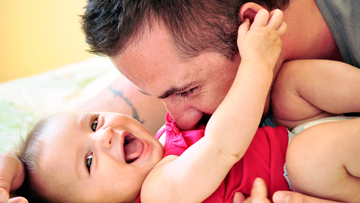To better understand the importance of fathering in today’s society, you have to better comprehend the impact fathers have on their children, the various cultural pathways to fathering, and how interventions with fathers can help them, their families and their children’s development.
Synthesis PDF Complete topic PDFInformation sheets
Download the free PDF version here or purchase hardcopy prints from our online store.
Father – Paternity
Father-Paternity: Different ways of being involved

Synthesis
How important is it?
Fathering practices have changed significantly over the past two decades in order to adapt to the changing economic, social, and cultural needs. Relative to a few decades ago, mothers are more likely to work outside of the home, thus requiring fathers to become increasingly engaged in the daily care of children. In addition, attitudes towards gender roles and expectations have also evolved over the years, in turn allowing fathers to play a more active role as caregiver. In fact, there is evidence that many fathers across the world are going beyond the breadwinner role and are increasingly involved in childcare and child rearing. While fathers continue to be one of the main sources of financial support, they also play a key role in the development of children by promoting their identity, cultural values, safety, social-emotional competence, and school readiness.
Looking at fatherhood across time and cultural settings is important as it broadens our understanding of the changing role of fathers, and contributing factors to their different level of engagement within the family.
What do we know?
The different trends in fathering can be explained by cultural, social, and financial factors. Cultural beliefs about gender roles and division of labour have an impact on family policies. For instance, in Sweden, fathers are entitled to 60 days of paid paternity leave. Similarly, in Spain, fathers are allowed 13 days of paternity leave and can get up to ten extra weeks. In addition to cultural beliefs, cultural values about family solidarity and integration (ex. familism) influence the level of father involvement. Relative to other minority groups in the United States, Latino fathers report higher levels of familism; they are described as highly engaged and responsible with their children.
However, regardless of these cultural beliefs and values, the extent of father involvement largely depends on the social and financial context. The Apartheid in South Africa, the Slavery in the United States, and the Indian Act in Canada are all examples of historical events and policies that have affected and continue to influence fatherhood practices. Given the poor employment opportunities, many black fathers in South Africa are forced to leave their family in order to find work. Similarly, African-American fathers in the United States and First Nations/Métis fathers in Canada have a higher likelihood of facing barriers relative to Caucasian fathers, which in turn limit the time spent with their children. Examples of such barriers include parental separation, incarceration, poverty, unemployment, and patterns of seasonal work.
Finally, there is a popular belief that father absence is associated with negative outcomes in children. Yet, there is increasing evidence that a father’s physical location and child involvement are two completely separate dimensions in the father-child relationship. According to research results, a high level of involvement by non-resident fathers (i.e., fathers who do not live in the same house as their children) may moderate the negative effects of their absence on their children’s adjustment. Taken together, father absence does not automatically mean lack of involvement, and by the same token, mere presence does not always guarantee father engagement.
What can be done?
Early Childhood Programs
Fathers are encouraged to participate in fatherhood intervention programs, such as Kangaroo Care and Early Head Start. These programs are designed to help fathers develop healthy parenting skills, a secure father-child attachment relationship, and effective intervention strategies. These strategies are especially important when children are at risk for future behavioural and/or social-emotional problems. In order to increase fathers’ participation, programs should include male staff and facilitators, provide a father-friendly environment, take into account cultural differences, and allow hands-on activities.
Policy and Research
Policies recommendations on fatherhood are more likely to be effective if they take into account the unique circumstances and needs of fathers and specifically target fathering skills as opposed to the larger umbrella of parenting skills. Furthermore, policies and interventions should be designed to support fathers who have limited opportunities to interact with their children. Finally, given that fatherhood is an emerging field of research, more prospective studies need to be conducted on the quality of fathering experiences, the types of effective interventions for fathers, and the different needs of fathers across cultures.
Overall, programs, policies, and research need to reflect diverse fatherhood experiences, as they allow us to understand the ways in which culturally specific parenting practices are beneficial to young children, and family as a whole.
Discover more

How do fathers influence their children?
Every society recognizes that fathers have positive influences on their children, although these influences do vary based on the sociocultural contexts.
Positive father involvement can:
- act as a protective factor and promote child well-being;
- positively impact children’s social competence, later IQ and other learning outcomes;
- decrease boys’ negative social behaviour (such as delinquency) and girls’ psychological problems in early adulthood.
When a father’s influence starts in early childhood, this can help with forming secure attachments, promoting social and emotional development, and influencing school readiness and success.
Publications

Resources and bulletins
The Encyclopedia also recommends...
MenCare
Early Childhood Development Intercultural Partnerships
Swedish Institute
Women and Men in Sweden - Facts and Figures 2014
Statistics Sweden, Population Statistics Unit
10 things that make Sweden family-friendly
Sweden Sverige
Fathers across Cultures: The Importance, Roles, and Diverse Practices of Dads
Jaipaul L. Roopnarine, Editor. Praeger 2015.
Shwalb, D., Shwalb, B., & Lamb, M. E. (2013) (Eds.). New York: Routledge.
Handbook of father involvement
Cabrera, N., & Tamis-LeMonda, C. (2013). (Eds.). New York: Routledge Press.
The role of the father in child development
Lamb, M. E. (2010). (Ed.). Hoboken, NJ: Wiley.







